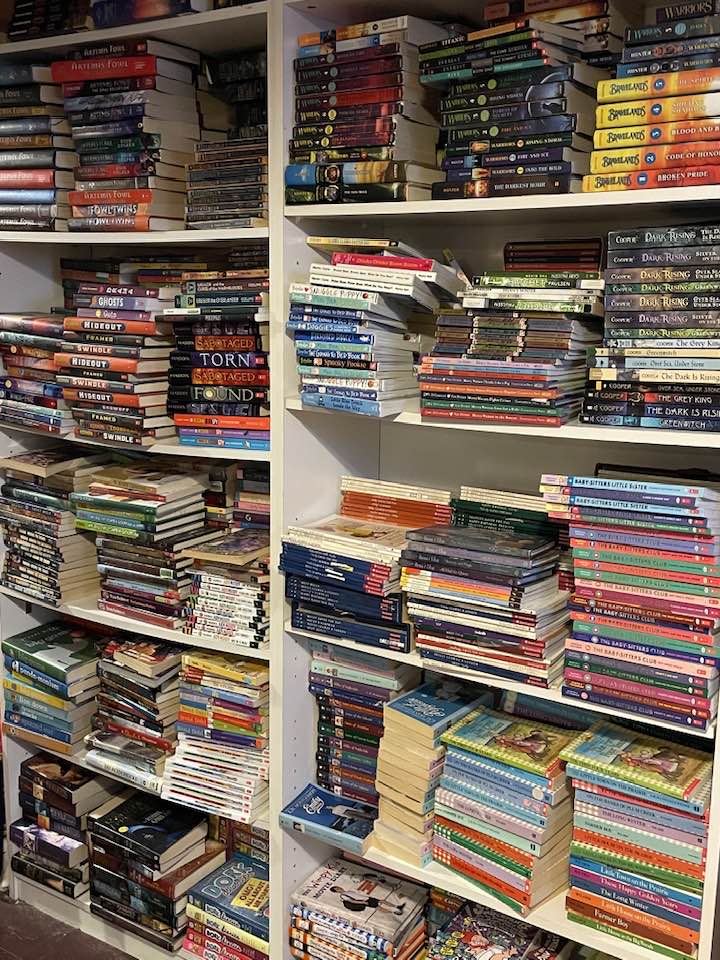MARCH 17, 2024 – This post—more likely, series of posts—is about pure Shakespeare at the same time it had nothing at all to do with the Bard. It has much more to do with books by way of an example of one . . . or perhaps three condensed into one.
From an early age I was familiar with books . . . and Shakespeare, though I didn’t read a word of the latter until Hamlet was assigned in sophomore English. My parents were big-time readers, and big-time readers tend to collect a lot of books. Between Mother and Dad they read fiction and non-fiction in equal parts—including Shakespeare, which is itself fiction and non-fiction in equal parts. A little more about that later in this series.
I remember the day when a postal truck delivered a sizable carton to the house. When Dad arrived home from work and Mother informed him of the carton, he tore into the box before even bothering to remove his bowtie and suit coat. I was in kindergarten, and I couldn’t recall a time when Dad had displayed such youthful enthusiasm. He took an extremely methodical approach to all his interests, whether he was playing the piano, building furniture, sweeping the garage floor (always using sweeping compound), or splitting firewood up at the cabin.
What he drew out of the carton and packing tissue were small blue compact volumes that contained the entire works of William Shakespeare. I had to wait for Dad to tell me, of course, because I couldn’t yet read and I’d never heard of Shakespeare. But as I observed Dad handle the books—running his hand gently across the covers and opening several carefully as if to prevent the words from spilling out and injuring themselves—I wondered if the books had been sent by the art museum. Fascinated by his ardor for them, I watched as he placed them neatly, one-by-one on the shelves behind the glass doors of the tall living room cabinet.
When Mother and Dad planned their new house, they dedicated a whole room to books, but over the half century they occupied their “castle,” a lot of books wound in many other parts of the house.[1]
Nearly all the books, including Dad’s beloved Shakespeare, vanished as part of the estate sale after Dad passed away and we moved Mother (and a handful of books) to assisted living. A single buyer loaded them all up in an industrial-size trailer attached to his pickup. I felt a wave of sadness wash over my thoughts as I noticed particular volumes among the mix, books that were like familiar friends and acquaintances who’d greeted me every time I’d passed through their secure habitat of the past 50 years.
* * *
It was a befitting coincidence, then, that I should marry the daughter of a school librarian. Both Mother and daughter had a fetish for books, and for years running I could expect Christmas and birthday presents in the form of books.
It was an inevitability, moreover, that eventually my wife would get into the business of selling used books online. She started with the periphery of our own household inventory—old textbooks, beach books, so forth. Once she’d gotten the hang of it, she removed the training wheels and went out and about to garage sales and thrift shops in search of additional inventory. By that stage of her business, she knew what sold and what didn’t—the most notable element of the latter group being “ancient” books, that without knowing the market, you and I would assume were valuable antiques, especially those in excellent condition.
My favorite phase of her business was when our local Barnes & Noble store maintained a sizable used book section. After collecting inventory on the cheap from her usual sources, whatever didn’t sell she’d haul up to Barnes & Noble, where she sold the remains, usually at a profit.
Over the years, her inventory swelled well beyond the capacity of our den, which she’d converted into her office. Books filled one half of the basement, and she commissioned a home remodeler to bust through a wall of the den and build out an adjoining section of what used to be a storage area in the back of the garage. I was impressed when I once heard her tell someone that at any given time she as many as 4,000 books listed on Amazon.
That was before “tub boxes” from the local grocery store spilled into the room adjoining her office and occupying the back entryway to the house, and occasionally, the chairs and settee in our reading room originally intended for just that—reading books.
Most of the authors and titles I’ve never heard of, and judging by the covers, few of the books would interest me, though I suppose I should put Harry Potter on my reading list. However, after finishing a book that does interest me—a book that I’ve acquired outside of the wholesale book distribution center that our house has become—I’ll check out the shelves of my wife’s “history section,” which occupies the storeroom adjacent to her den/office.
This is how I discovered what turned out to be a fascinating book by Stephen E. Ambrose, Crazy Horse and Custer. I’d read some of his other works but never heard of this title. There it sat “in inventory”—not exactly flying off the shelf: it had collected a bit of dust on top. Once I’d pilfered it, I couldn’t put it down (or back on the shelf) until I’d finished reading it.
All of which now leads me back to Shakespeare, but not in the way you might imagine . . .
Stay tuned. (Cont.)
Subscribe to this blog and receive notifications of new posts by email.
© 2024 by Eric Nilsson
[1] See January 20, 2023 post regarding a particularly notable book, Talks on Manure.
